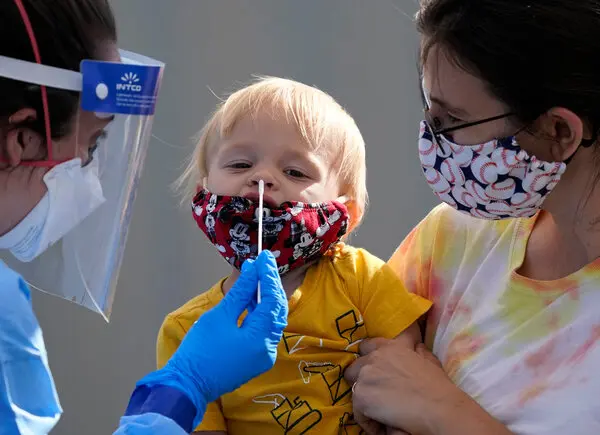In the heart of Nampally, Hyderabad, a poignant chapter unfolds at Niloufer Hospital, where a 14-month-old baby boy has become a symbol of resilience in the face of the ongoing Covid-19 pandemic. Admitted with classical symptoms of Severe Acute Respiratory Infection (SARI), the infant’s journey through diagnosis and treatment sheds light on the hospital’s proactive response and the broader challenges in safeguarding the health of our most vulnerable citizens.
The narrative begins with the arrival of the baby at Niloufer Hospital, exhibiting telltale signs of SARI – fever, cough, cold, and breathlessness. These symptoms, characteristic of respiratory distress, triggered the hospital’s medical team to take swift action. Recognizing the potential gravity of the situation, they opted to conduct a Reverse Transcription Polymerase Chain Reaction (RTPCR) test, a gold standard in diagnosing Covid-19.
The results were both expected and concerning – the 14-month-old had indeed tested positive for the coronavirus. In these critical moments, the spotlight turned to Superintendent Dr. Usha Rani, who offered a beacon of hope amid the uncertainties. She shared that, despite the challenging circumstances, the baby’s condition remained stable and was gradually showing signs of improvement.
This revelation brings forth the hospital’s commitment to transparency and its prioritization of patient well-being. It also highlights the intricate dance between medical expertise and the unpredictable nature of infectious diseases, especially when the patient is an infant. The delicate balance required in treating such cases underscores the dedication and resilience of healthcare professionals at Niloufer Hospital.
What follows is a testament to the hospital’s proactive stance in the battle against the virus. Niloufer Hospital, recognizing the need for swift and comprehensive action, initiated testing for all patients presenting with typical symptoms of Influenza-Like Illness (ILI) and SARI. This strategic move aims not only to identify and isolate potential Covid-19 cases promptly but also to curtail the risk of transmission within the healthcare facility.
The hospital’s readiness for such scenarios is underpinned by its existing infrastructure – a legacy of 120 exclusive beds with a continuous supply of oxygen. These facilities, established during the previous administration, reflect a foresighted approach to healthcare infrastructure development. In times of crisis, they serve as a crucial lifeline for patients requiring respiratory support, such as the 14-month-old at the center of this narrative.
Zooming out from this individual case, the episode at Niloufer Hospital echoes the broader challenges faced by healthcare systems globally. The delicate dance between preparedness and the unforeseen nature of infectious diseases requires constant adaptation and innovation. It underscores the importance of not only reactive measures but also proactive strategies in curbing the spread of contagious illnesses.

As the baby boy continues his journey to recovery, the dedicated medical staff at Niloufer Hospital remains vigilant. Their watchful eyes and experienced hands guide the infant through each critical moment, adjusting treatment plans and interventions as needed. This commitment to personalized care echoes the larger narrative of healthcare professionals worldwide – navigating uncharted territory with determination and compassion.
Beyond the hospital walls, the community grapples with the broader implications of this case. It serves as a stark reminder that, despite advancements in medical science, no one is immune to the reach of infectious diseases. The interconnectedness of our global society demands a collective response – one that transcends borders and emphasizes the shared responsibility of safeguarding public health.
In conclusion, the unfolding story of a 14-month-old baby testing positive for Covid-19 in Hyderabad encapsulates the challenges and triumphs inherent in the ongoing battle against the pandemic. Niloufer Hospital’s swift and transparent response, coupled with its well-established infrastructure, paints a picture of resilience and dedication. The narrative serves as a microcosm of the larger global effort to navigate the complexities of infectious diseases and underscores the importance of collective action in ensuring the well-being of individuals and communities alike.


